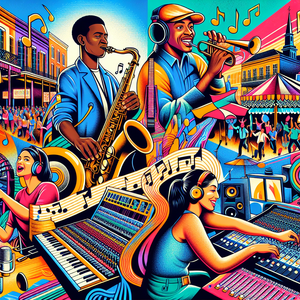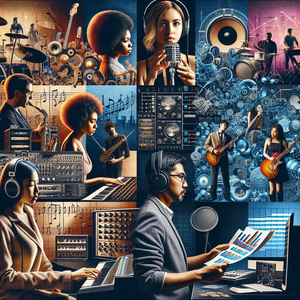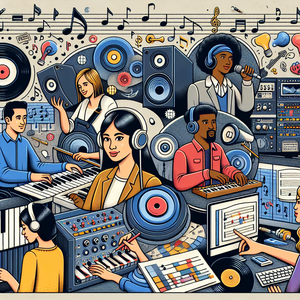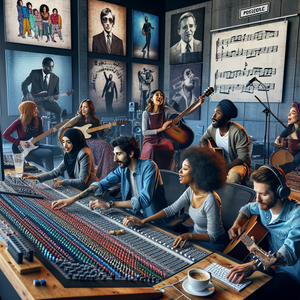
Exploring 20 Dynamic Careers in the New Orleans Music Industry: Insights, Roles, and Opportunities
The music industry is a vibrant and diverse field, particularly in culturally rich cities like New Orleans, which is celebrated for its unique musical heritage and lively scene. As the local music environment continues to evolve, a plethora of career opportunities are surfacing, appealing to various interests and skill sets. This article delves into 20 distinct roles within the music industry, detailing their responsibilities, necessary qualifications, and their contributions to the cultural tapestry of New Orleans.
Job Summaries:
Music Director:
- Music Directors are integral to shaping the musical aspects of performances and events.
- They lead rehearsals, coordinate with artists, arrange music, and ensure that the final output aligns with the artistic vision.
- Typically requiring a degree in music or a related field, candidates should exhibit strong leadership, communication, and organizational abilities.
- In New Orleans, music directors are pivotal in maintaining the quality of performances, working with theater companies, orchestras, and live bands.
Music Teacher:
- Music Teachers are vital for inspiring and educating future musicians.
- They create lesson plans, assess student progress, and often participate in performances to showcase their students’ talents.
- A bachelor's degree in music education and relevant certifications are usually required.
- In New Orleans, music teachers play a crucial role in nurturing creativity and ensuring the city’s musical legacy is preserved for future generations.
Music Supervisor:
- Music Supervisors manage the selection and integration of music in films, television, and other media.
- They collaborate with directors and producers to curate soundtracks that complement the narrative.
- While a background in music composition or production is beneficial, strong negotiation skills are essential for securing licensing deals.
Touring Musician:
- Touring Musicians perform live across various venues, representing bands or solo artists.
- Their responsibilities include rehearsing, traveling, and engaging with fans.
- While formal education isn’t strictly necessary, extensive experience and proficiency in a particular instrument or vocal performance are crucial.
Music Promoter:
- A Music Promoter is responsible for marketing and organizing live music events to attract audiences.
- They manage advertising campaigns, liaise with venues, and negotiate contracts.
- Successful promoters often have a background in marketing and exhibit excellent networking skills.
Artist and Repertoire (A&R) Representative:
- A&R Representatives scout and sign new talent for record labels, focusing on artist development.
- They assess demos, provide constructive feedback, and help shape artists' sounds.
- A background in music business is typically required, along with strong analytical skills.
Music Publicist:
- Music Publicists manage artists’ public images.
- Promoting their work through press releases and media outreach.
- Strong writing and communication skills are essential.
- Often supported by a degree in communications or marketing.
Booking Agent:
- Booking Agents secure performance opportunities for artists at various venues and festivals.
- They negotiate contracts, coordinate schedules, and build relationships with venue managers.
- A background in music business is helpful, along with strong negotiation skills.
Music Coordinator:
- Music Coordinators curate music selections for events like corporate gatherings or private parties.
- They collaborate with clients to create playlists that enhance the atmosphere.
- Strong organizational skills and a keen ear for music are vital for this role.
Music Librarian:
- Music Librarians manage collections of music scores and recordings
- Often working in educational institutions or public libraries
- They assist patrons
- May provide educational programs
- A degree in library science or music is typically required
Production Assistant:
- Production Assistants support various aspects of music production.
- Helping set up equipment.
- Managing schedules.
- Handling logistical tasks.
- No specific degree is necessary.
- Enthusiasm and a willingness to learn are essential.
Sound Engineer:
- Sound Engineers focus on the technical side of music production.
- They ensure high-quality sound recordings and live performances.
- They operate sound equipment.
- They mix tracks.
- They troubleshoot audio issues.
Music Marketing Specialist:
- Music Marketing Specialists develop and implement strategies to promote artists and their work.
- They utilize social media and advertising to reach target audiences.
- A degree in marketing is often helpful, along with strong analytical skills.
Digital Content Creator:
- Digital Content Creators produce engaging online content related to music.
- Content includes videos and social media posts.
- Formal education isn’t strictly necessary.
- Experience in multimedia production is beneficial.
Music Licensing Specialist:
- Music Licensing Specialists handle the legal aspects of music usage.
- Ensuring compliance with copyright laws.
- A background in law or music business is helpful.
Music Therapist:
- Music Therapists use music to improve individuals’ mental and emotional well-being.
- They create tailored interventions.
- They often work in hospitals or schools.
- A degree in music therapy and certification are required.
Event Coordinator:
- Event Coordinators plan and execute music events.
- Managing logistics and vendor relations.
- Strong organizational skills are vital.
- Often supported by a background in event management.
Music Industry Consultant:
- Music Industry Consultants provide expert advice on business strategies and market trends.
- They analyze conditions and identify growth opportunities.
Social Media Manager:
- Social Media Managers create and manage online content for artists or organizations.
- They craft engaging posts that reflect the artist's brand while analyzing audience preferences.
Music App Developer:
- Music App Developers design software applications related to music.
- They create applications ranging from streaming services to educational tools.
- A background in computer science is essential.
These diverse job roles represent a wide range of opportunities within the music industry, particularly in a culturally vibrant city like New Orleans. For individuals interested in pursuing these careers, exploring current openings, attending industry events, and networking with professionals is highly recommended.
Explore More Jobs

